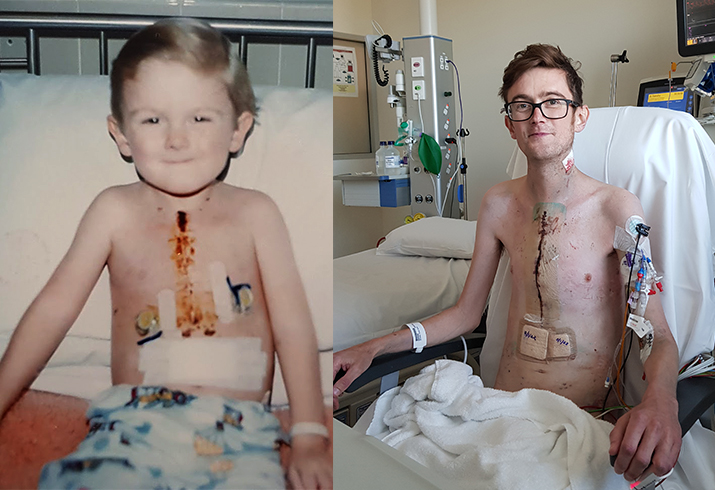Transplant recipient's heartfelt thanks for ultimate gift

For 36 years, Dan Beard played the numbers game.
8 surgeries and 3 procedures – the first at just 3 months old.
14 months attached to a wearable defibrillator – 24 hours a day, 7 days a week.
1 lifesaving heart transplant.
Born with a number of complex heart conditions, the self-employed graphic designer had surgery at 3 months, 3 years, 18, 27, 32 and 36.
“I had multiple issues with my heart when I was born - the easiest description was a hole in the heart but there were other complex heart issues as well,” Dan said.
“Following my initial surgery when I was three years old, I lived a relatively normal life for a kid until revision surgery when I was 18.”
Despite the surgeries, Dan’s heart muscle had begun to thicken which meant he was constantly admitted to hospital with breathlessness, chest pain and heart palpitations. At 32, he had a pacemaker fitted at Fiona Stanley Hospital (FSH).
Then one night as he was laying down in bed, he experienced a ventricular tachycardia episode.
“I felt a sudden rush in my heart rate, as if it were about to explode, before blacking out,” he said.
Thankfully his pacemaker device had recorded the episode and his cardiac team made the decision he would need to go onto the transplant list. His options were beginning to run out.
“I was only allowed to leave the hospital after being fitted with a wearable defibrillator that I wore 24 hours a day for 14 months until the night before my heart transplant surgery - I think I hold the record!”
For 410 days he waited for that life changing call – which came at the end of 2021. The wait was over.
“I describe it to people like being dropped into a new body. My old heart was only running at half capacity – I didn’t know any different.”
“I was very close to being inoperable and I could feel that my heart was failing me. I honestly think I wouldn’t be here today without the transplant.”
“Organ donation doesn’t just change the life of the recipient – it impacts their partner, their parents, their friends and their colleagues – a whole community is given the opportunity to continue living,” Dan said.
Nurse Practitioner, Clare Fazackerley, has spent almost 30 years working with the Cardiac Transplant Service at FSH and manages the care of each patient pre and post-transplant.
“Heart transplantation is a treatment not a cure. Having a new heart takes a lot of work and commitment to stay healthy - our recipients can return to family life, the workforce and many become active members of their community highlighting the benefits of transplantation and encouraging others to become organ donors,” Clare said.
“It never ceases to amaze me - watching the transformation from a person who was so recently close to death and unable to walk more than a few metres - to one who just a few weeks after transplant has regained their physical independence and is home with family and living again.”
In WA, the average length of time a patient waits for a heart transplant is around 160 days.
This week, Sunday 28 July - Sunday 4 August is DonateLife Week, and each year the national awareness week encourages more Australians to get behind organ and tissue donation.
Currently 4 in 5 Australians say they support donation, but only approximately 1 in 3 (36%) are registered to be a donor on the Australian Organ Donor Register (AODR).
DonateLife State Medical Director, Dr David Blythe, said there are 1800 Australians on a organ transplant waitlist and that in WA last year there were 43 recipients who received a second chance at life.
“The most important thing you can do is have the conversation with your loved ones – talk to your family about your wish to be an organ donor - and once you’ve done that then take the few minutes to register online with the AODR. It just might save a life,” David said.
And for Dan – he’ll take those odds any day.


